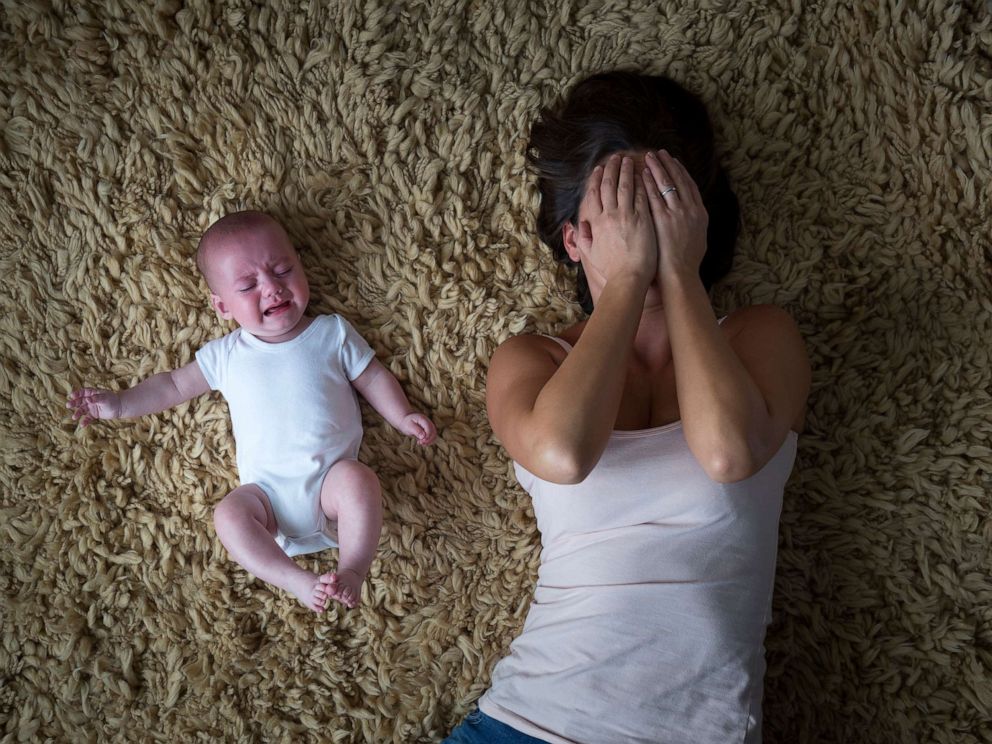Anxiety, depression increasing among mothers during the COVID-19 pandemic
The emotional stress could leave a lasting impact on both mother and baby.
More pregnant women and new mothers are experiencing symptoms of anxiety and depression during the COVID-19 pandemic, according to a new study.
The disruptions of the COVID-19 on daily life has left many feeling anxious or depressed, making the future seem uncertain, but these feelings are normal, according to a new study shedding light on the emotional toll the pandemic has had on new mothers.
Researchers from the University of Alberta interviewed 900 new mothers and found that 40.7% of new moms had depressive symptoms compared to 15% before the pandemic. The study also said that 72% of new mothers felt moderate to high anxiety, a 43% increase from the number of new mothers reporting anxiety before the pandemic.
"We wanted to conduct this survey to learn more about the impact of COVID-19 on the mental health and physical activity of women during and following pregnancy," Dr. Margie Davenport Associate Professor at the University of Alberta, who co-authored the study, told ABC News. "Our data demonstrate a substantial increase in the likelihood of maternal depression and anxiety in pregnant and postpartum women during the COVID-19 pandemic."
Regardless of the current climate, previous research has shown that depression and anxiety affect one in seven women while pregnant. The many changes brought along with this pandemic, like the social and physical isolation, spending more time in the house, social distancing, and worrying about the health of those close around us, may exacerbate the pre-existing stressors of pregnancy and beginning motherhood, causing feelings of depression to anxiety rise.
"These numbers may underestimate how depressed and anxious pregnant women are in this time just because of the group of individuals who responded to this survey," Dr. Nita Landry, a board-certified obstetrics and gynecologist, told ABC News.
This study only interviewed new moms, but the emotional toll of the pandemic may in fact be much larger, affecting all pregnant women and moms.
"This [study] elucidated prioritizing yourself can help prevent and combat these feelings of anxiety and depression. Many pregnant women stay in their homes during pregnancy because they are so anxious to get infected, while the risks are very limited outside if you keep social distance," Dr. Veerle Bergink, a board-certified psychiatrist and director of the Women's Mental Health Program at Mount Sinai Medical Center, said. "This is especially a huge problem for women in small apartments, living with toddlers or many other family members."
"It may not just be a virus that pregnant women are stressing out, but there's other factors that come into play because of this virus, such as economic hardships," Nita added.
Experts say the emotional impact of anxiety and depression could also leave a lasting physical impact on both mother and baby.
"When moms aren't doing well emotionally during pregnancy, it really can have a negative impact on their pregnancy," Nita said. "As far as increasing incidence of pre-term delivery. You are developing a human being and the whole complex process of growing a tiny person, impacts baby and their cognitive development."
The good news is pregnant women and moms can help prevent or lessen the emotional toll by making it a priority to make time for themselves, their mental health and continue doing activities they enjoy. Bergink said that now more than ever, pregnant women and moms should prioritize physical activity or exercise every day.
"We also demonstrate [in the study] that women who engage in higher levels of physical activity had better mental health," Davenport said.

Although the need to socially distance and stay home remains, there are many online bloggers that are sharing creative ways to get moving and active in your own living room.
"We've also seen a rise in free online fitness classes which can help promote physical activity," said Davenport. "However, walking can provide incredible benefits for mental health, while following physical distancing measures."
"In addition to exercise and fresh air, many other things work, including yoga, mindfulness, meditation, social support groups, chatting with friends and hobbies," said Bergink.
Finding support from friends and family and connecting even if physically separated is also important, experts say.
"One thing that family can do is know that their spouse or family member may be struggling during this time period and may be reluctant to ask help," Nita said. "If you see changes in mood or behavior, then you can ask if you're concerned about them hurting themselves. Some people think if you ask someone about hurting themselves then that will increase the probability of it, but that's not the way to think about it."
If you or a loved one feel high levels of anxiety or depression, you should seek treatment, Bergink said.
"Don't hesitate to seek help from a healthcare professional. Whether it be counseling or in some instances if you do need medications, know that those things are around to assist you and it's ok to meet that type of assistance," said Nita.
In addition, there are resources out there, especially for mothers dealing with anxiety and depression, such as the Women's Mental Health Program at Mount Sinai , a group who care for women with mental health needs especially related to pregnancy
If you have or know anyone who needs help or is experiencing feelings of hurting themselves or others, call the SAMHSA's National Suicide Prevention Lifeline 1-800-273-8255.
Alexis E. Carrington, M.D. is currently a Dermatology Research Fellow at the University of California, Davis in Sacramento, CA, and a contributor to the ABC News Medical Unit.




